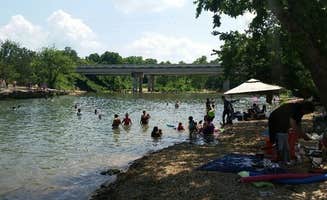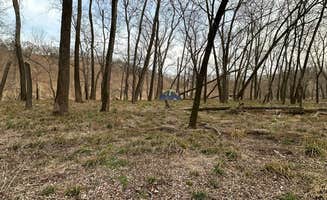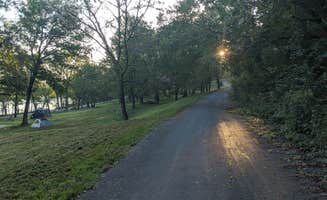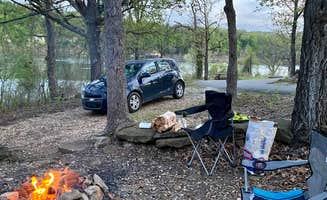Tent campsites near Colcord, Oklahoma feature diverse terrain options ranging from creek-side spots to lakefront locations. The region sits at approximately 950 feet elevation with summer temperatures averaging 85-95°F and winter lows frequently dropping below freezing. Many camping areas don't take reservations during off-season months (November-March), requiring campers to arrive early for prime spots.
What to do
Swimming at natural waterfall areas: Gibson Spring in Fort Crowder Conservation Area offers opportunities to cool off in spring-fed waters. According to one reviewer, "The site has several picnic tables, a trash can and a BBQ grill that someone left behind. Your water source is the spring itself, remember to treat the water."
Fishing in early morning hours: The Illinois River watershed provides excellent fishing conditions, particularly around Highwater Camp. One camper noted, "If you are looking for a nice place on the Illinois River to camp, float the river, set shuttle or just hang out, this is a very nice place. You will enjoy the privacy compared to other campgrounds in the area that have large crowds."
Hiking multi-use trails: The region offers numerous walking paths through Ozark foothills. At Fort Crowder Conservation Area, "The conservation has 11 miles of multi-use trails to explore (foot, bike, horse)," making it ideal for day excursions from your campsite.
Bird watching at sunrise: Many tent sites provide excellent wildlife viewing opportunities. Early risers at Horseshoe Bend Primitive Public Use Area report seeing "multiple species of Oklahoma's woodpeckers, some birds of prey, and many songbirds" according to a recent visitor.
What campers like
Secluded camping spots: Many campers appreciate privacy at less-developed sites. At Highwater Camp, the sites "are large and open with lots of shade trees and could easily accommodate much larger groups if needed," providing a more isolated experience than commercial campgrounds.
Natural water features: The region's water elements enhance the camping experience. At Natural Dam, one camper described how "the fog off the waterfall was eerily gorgeous" in the morning, creating memorable views for photographers and nature enthusiasts.
Affordable camping options: Most primitive sites in the area are free or low-cost. Jackson Bay Recreation Area receives praise as an "amazing free campground, you can stay here for 14 days. No amenities, but it's well taken care of. Some spots have grills and picnic tables."
Easy access to water recreation: Many sites offer direct water access. One visitor to Flint Creek mentioned, "They have a nice, expansive swimming and wading area all along the creek. There are deep pools and shallow wading areas to fit all ages and abilities."
What you should know
Pack-in, pack-out requirements: Most tent sites have minimal waste facilities. At Jackson Bay Recreation Area, campers note the "only drawback I wish there were trash cans or even just a big dumpster," emphasizing the need to plan for waste management.
Vehicle requirements: Many access roads become challenging after rainfall. For Horseshoe Bend Primitive Public Use Area, "Dirt road was rough, but a camaro managed to get through somehow the morning we left," though most reviewers recommend high-clearance vehicles.
Water safety concerns: River and creek levels fluctuate seasonally. At Highwater Camp, campers should "be careful when camping, as it is near the river and if the water gets high, you will need to move up to the higher bank."
Reservation considerations: Many popular sites fill quickly during peak seasons. Highwater Camp requires planning as "it fills up fast and they do not offer more than one or two spaces per day."
Tips for camping with families
Choose swimming areas with varying depths: When camping with children of different ages, seek out locations with water access suitable for various skill levels. At Flint Creek, "They have a nice, expansive swimming and wading area all along the creek. There are deep pools and shallow wading areas to fit all ages and abilities. The park is clean and spacious."
Bring portable toilet facilities: Most primitive sites lack permanent restrooms. While some areas like Flint Creek have "only port-a-johns but they work," most locations require bringing your own sanitation supplies.
Plan wildlife viewing activities: The region offers educational opportunities to observe native species. At Tenkiller State Park's Eagles Point, families can experience "plenty of wildlife" as part of their camping experience, making morning nature walks productive for young explorers.
Prepare for wildlife encounters: Snakes and other wildlife are common in warmer months. At Eagles Point, visitors are warned "be aware rattlesnakes also enjoy the area," necessitating proper footwear and caution around rock formations.
Tips from RVers
Scout sites before committing: Many campgrounds have challenging access roads. At Sequoyah Bay State Park Campground, visitors observed "some sites near the water that looked tricky to get into, but you'd be right by the water, so that's the trade off."
Angle considerations: Look for sites with strategic positioning for privacy. At Sequoyah Bay State Park, campers appreciate the "easy, level sites at a nice angle, so you aren't facing right at the back of someone else's trailer."
Dump station access: Not all locations offer sewage facilities. Sequoyah Bay State Park has "dump sites easy to manage," making it a good option for ending a multi-site camping trip.





